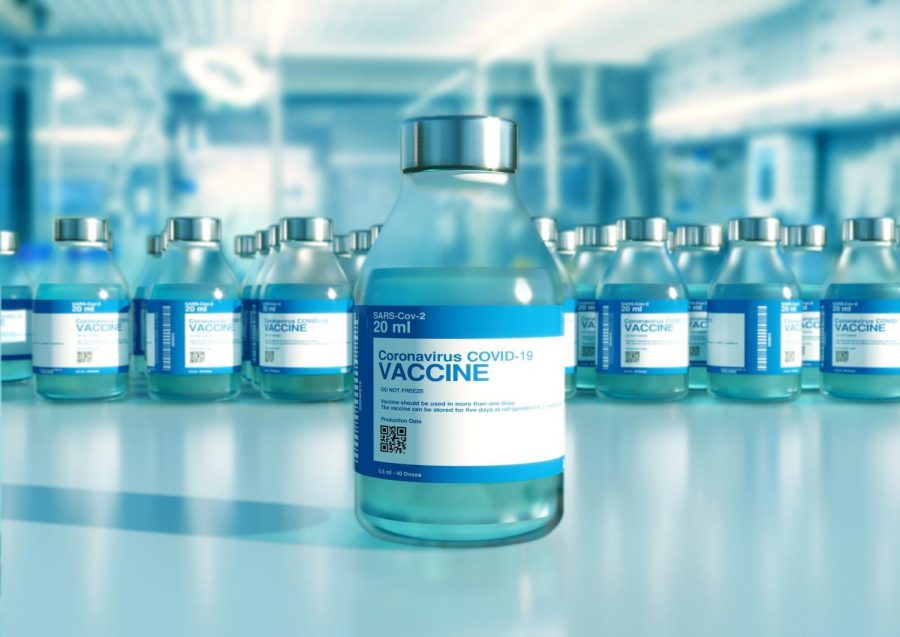COVID vaccines met with eagerness, but skepticism arises
With the announcement of the first COVID vaccine being available in early December, many were willing to be first in line, while others were much less eager to be injected with the hastily developed product.
Ruth Apker, an X-ray technician at Halifax Health in Daytona Beach, Fla., and a grandparent of a Pioneer student, was among the nation’s health care workers that got access to the first vaccine.
“The first vaccine was just like getting a flu shot,” she says. “I really only had a sore arm for about a week.”
Feeling slightly apprehensive about the second shot, Apker was worried as she had heard of a higher risk of associated symptoms. It was only four short hours after getting the second shot that she started to feel the symptoms that everyone had talked about.
“I started to really feel the effects of the vaccine after about four hours,” she said. “I had a bad headache, a 102.6 fever, I was really tired and felt very short of breath.”
Despite the minor reaction to the shot that cleared up fairly quickly, Apker said she has no regrets.
“Working in the hospital I am exposed to all kinds of things daily, so I need to take all the precautions I can,” she said.
At the time of this article, 50% of Ann Arbor teachers had received their first vaccine, according to survey data provided by the Ann Arbor Public Schools, while around 37% reported they aren’t even scheduled to receive the vaccine yet. Though teachers over 50 were to be contacted by Washtenaw County about scheduling the vaccine shot, some said they have yet to receive information regarding their appointment, and despite receiving the vaccine, some Ann Arbor teachers are still worried about going back to school.
Ann Arbor’s teacher’s union, the Ann Arbor Education Association, also surveyed teachers about their vaccination status and return-to-school plans. Their initial survey showed that 2.6% of teachers reported they “do not plan” to be vaccinated, while 55% have had the first shot and 29% are fully vaccinated. In that same survey, 26% of teachers said they want to remain fully virtual for instruction regardless of their vaccination status, while another 32% do not want to return until they are fully vaccinated.
Pioneer parent Genevieve Grainger, a technician at Kellogg Eye Center, said she is thinking twice about getting the COVID vaccine.
“I feel as though it was a rushed experiment,” she said. “It can take years to develop these things. We have yet to create a vaccine for cancer or AIDS, but only months to come up with a COVID shot. Not enough research was put into the creation of it.”
Even as the results come in, and as the vaccine seems to be more helpful than harmful, Grainger said she still does not see herself signing up for it.
“I have too many autoimmune issues: Lupus and a blood clotting disorder. It makes me really nervous to have something disrupt my system that could be potentially deadly to me,” she said.
Despite not getting the vaccine, Grainger admits being nervous about not getting the vaccine as she continues to closely work with patients and will soon have a child attending Pioneer High School in person.
When students do return, while many teachers will be vaccinated, few of the students will be. The U.S. Centers for Disease Control and Prevention has reported that since Dec. 14, more than 76 million doses have been administered, reaching 15.3% of the total U.S. population. Although the vaccine has been out for a couple of months, trials are underway for testing children with the vaccine under the age of 18.
Some students seem apprehensive going back to school without the protection of the vaccine, and though not much testing has been done on the vaccine for children, many say they would still receive the shot as soon as they could.
“I would definitely do one of the trials if I was allowed, and I would get the vaccine as soon as possible,” said Skyline freshman Logan Abrams.
For many students, the vaccine offers a promising choice.
“I want to have better protection against the virus, especially since I have asthma,” said Lawrence Peeple, a freshman at Pioneer.


